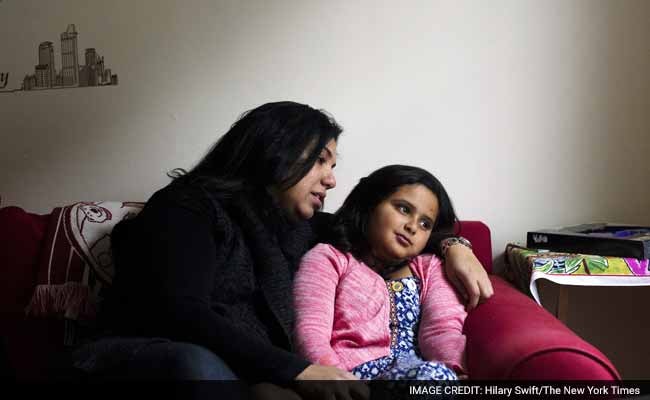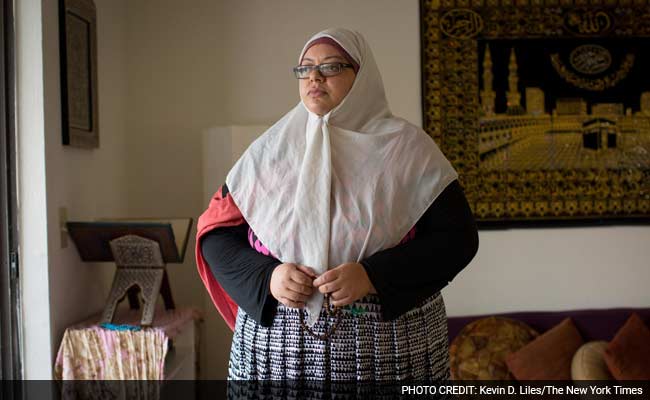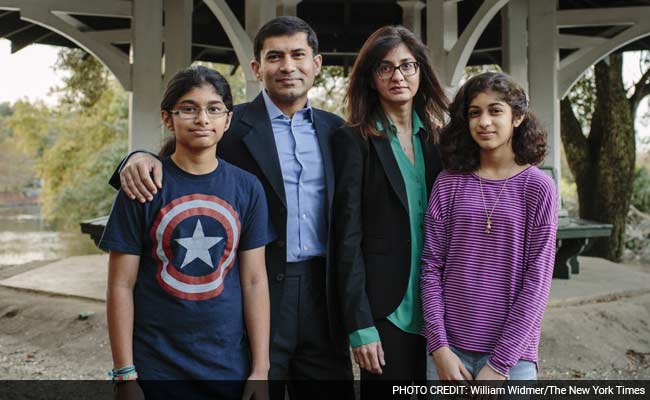
Sarah Eltabib and her daughter, Aleena Abdelhady, 9, at home in Oyster Bay.
A Muslim parent in Tokyo tells her children to "work 100 times harder" and "be 100 times kinder." A father in Ontario advises his teenagers to be wary of anyone reaching out to them over the Internet and claiming to be Muslim. "ISIL is trying to recruit you," he tells them, referring to the Islamic State.
Parents around the United States tell their children that they can be both American and Muslim - no matter what anyone says, they do not need to choose between the two.
A wave of recent attacks by extremists acting in the name of Islam - including in San Bernardino, California, this month - has contributed to a rise in anti-Muslim speech in the United States, Europe and elsewhere. The New York Times asked its readers who are Muslim how they talk to their children about these difficult times.
Close to 250 people responded. Many wrote about how they try to teach their children that terrorists do not reflect them or their faith.
Here is a selection of the responses; they have been edited and condensed.
Fawad Zakariya in Palo Alto, California. Children ages 14 and 11.
"I am a naturalized Pakistani-American, as is my wife. My kids were born here. They are indistinguishable from any other American kids.
One loves musical theater, the other Minecraft and baseball.
"We tell them to be proud of every part of their identity: American, Californian, culturally Muslim, liberal Democratic, South Asian brown, but most importantly we teach them to be kind and fair human beings."
Muna Hussaini in Austin, Texas. Child age 7 and another due in February.
"I have told her that sometimes people may make the choice to say things about our religion that aren't beautiful. These things may make her have feelings that are sad, mad, angry, hurt, confused... Her job will be to keep her body safe and to find a teacher or trusted adult to help her.
"I have had to help her learn how to dial 911 if needed and what she should say. I have made her build a list of trusted adults she can talk to, whether at school or in our neighborhood, and whom she can go to for help.
"I am scared for my child's safety, and I want to balance keeping her informed and empowered vs. scaring her."
Nadeem Ahmed in Mississauga, Ontario. Children ages 18 and 16.
"People always fear the unknown. Just like you are afraid to go down to a dark basement - you fear what you don't know. People fear Islam and Muslims because they don't know us.
"I tell them, be wary, ISIL is trying to recruit you. They want you to feel like you are not at home here and this is not your country. It is.
"You need to be very careful of anyone reaching out over the Internet claiming to be a Muslim. You need to come to a parent right away.
"The West and Islam are compatible. In fact Islam is more compatible with the ideas of freedom, tolerance and equality than most countries that call themselves Muslim are.
"There is no need for a caliphate; we enjoy religious freedom here."
Karla N. Evans in Lawrenceville, Georgia. Child age 16.

"Those carrying out acts of terror in the name of Islam are not representative of who we are or what we believe as Muslims in any way.
"I do not tell my son that they are not Muslim, but rather that they have an extreme mindset and would likely be extreme no matter their religious tradition, and that there is nothing inherently violent in the teachings of Islam."
Elisabeth Becker Topkara in New Haven, Connecticut. Child age 1 1/2.
"My son comes from a 'mixed' marriage between a Jewish woman and Muslim man (although we are very much alike). I tell my son, every night, that he was made from love that ascended borders and he himself is hope - no, proof - that the world can do better."
Sarah Eltabib in Oyster Bay, New York. Child age 9.
"Since we are a family that focuses education on global citizenship, and I myself am a human rights historian, I tend to give her a more worldly view and expose her to different types of literature. So, I read her one of my favorite "Little Prince" excerpts, then talked about what it means:
"'There were terrible seeds on the little prince's planet... they were baobab seeds. The planet's soil was infested with them. Now, a baobab, if you set about it too late, you can never get rid of it. It takes up the whole planet. It pierces it with its roots. And if the planet is too small, and if there are too many baobabs, they will make it burst.'" (Antoine de Saint-Exupery, "The Little Prince")
Bibi Voyles in Tokyo. Children ages 10 and 5.
"I tell my children that they must work 100 times harder, be 100 times kinder, and always be well groomed, just to gain public acceptance in these trying times.
"I tell them to always be gentle, soft-spoken, and kind so that they cannot be associated with the growing global paranoia around 'extremist Muslims.'"
Aiza Siddiqi in Baltimore. Child age 2.
"A few weeks ago, my son's preschool asked parents to come in and share a holiday tradition with the class. Since my son is the only Muslim in his class, I thought this would be a good opportunity to introduce the young children to Islam. Then I started reading Facebook posts of friends and acquaintances describing verbal and physical attacks on Muslims in schools, parking lots, and buses.
"I began to think: 'Do I want my son's peers and teachers to know that he is Muslim? Will his Christian preschool treat him differently if he identifies as Muslim?' I hated myself for even asking these questions because I have never been one to deny or hide my identity.
"I decided to do a presentation for my son's class. Not that explaining Islam to a room full of 2-year-olds will drastically win over hearts and minds, but education is one of the best tools we have to counter the ignorami who malign our faith."
"NS" in Lake Oswego, Oregon. Children ages 9, 6, and twins who are 23 months.
"I remind them to be good, smile and make lots of friends. Their friends will always know what a good person you are."
Tiffany Soule Thiri in Sebring, Florida. Children ages 8 and 1.
"We are an interfaith family (Muslim dad, Sufi/Unitarian mom, Muslim daughter and one daughter who was baptized Christian). We explain that it is not our daughter's burden to explain her daddy's religion, but she should always feel comfortable contributing to the conversation if she wants to. She is not responsible for defending her Muslim friends and family, but she should always feel proud to be a part of the family that we have created.
"We laugh and tell jokes and remember silly moments, just like any family. We celebrate traditions, like Eid al Adha, Christmas and Ramadan, and we read about the history of these practices.
"We talk about how a very small group of bad people have done some bad things. We are not defined by the actions of a few."
Mehnaz Mahmood in McKinney, Texas. Children ages 9 and 7.
"I try to be a strong Muslim woman with good manners; I let them know that I am not afraid to wear my hijab out and that they should be proud of being both American and Muslim."
Zeigham Khokher in New Orleans. Children ages 18, 13 and 12.

"We try to instill in them that they should stay strong. However, as a concerned parent, I nevertheless encourage them not to discuss faith with anyone.
"I tell my kids that they have nothing to be ashamed of, they have no responsibility for people they do not know in places they have never been to. We emphasize that our Islam, the one that serves as a foundation for our life, shares nothing with such barbarism."
Aden M. in the Bronx, New York. Child age 8.
"I ask him every day to report to me if anything hurtful was said to him or if any adult made him uncomfortable. I tell him to be ready to fight back if someone physically assaults him.
"I tell him that some people may blame us for things that other people who claim to be Muslim do. I tell him people are scared and might do things that are wrong, out of fear.
"I tell him there is nothing wrong with being Muslim."
Parents around the United States tell their children that they can be both American and Muslim - no matter what anyone says, they do not need to choose between the two.
A wave of recent attacks by extremists acting in the name of Islam - including in San Bernardino, California, this month - has contributed to a rise in anti-Muslim speech in the United States, Europe and elsewhere. The New York Times asked its readers who are Muslim how they talk to their children about these difficult times.
Close to 250 people responded. Many wrote about how they try to teach their children that terrorists do not reflect them or their faith.
Here is a selection of the responses; they have been edited and condensed.
Fawad Zakariya in Palo Alto, California. Children ages 14 and 11.
"I am a naturalized Pakistani-American, as is my wife. My kids were born here. They are indistinguishable from any other American kids.
One loves musical theater, the other Minecraft and baseball.
"We tell them to be proud of every part of their identity: American, Californian, culturally Muslim, liberal Democratic, South Asian brown, but most importantly we teach them to be kind and fair human beings."
Muna Hussaini in Austin, Texas. Child age 7 and another due in February.
"I have told her that sometimes people may make the choice to say things about our religion that aren't beautiful. These things may make her have feelings that are sad, mad, angry, hurt, confused... Her job will be to keep her body safe and to find a teacher or trusted adult to help her.
"I have had to help her learn how to dial 911 if needed and what she should say. I have made her build a list of trusted adults she can talk to, whether at school or in our neighborhood, and whom she can go to for help.
"I am scared for my child's safety, and I want to balance keeping her informed and empowered vs. scaring her."
Nadeem Ahmed in Mississauga, Ontario. Children ages 18 and 16.
"People always fear the unknown. Just like you are afraid to go down to a dark basement - you fear what you don't know. People fear Islam and Muslims because they don't know us.
"I tell them, be wary, ISIL is trying to recruit you. They want you to feel like you are not at home here and this is not your country. It is.
"You need to be very careful of anyone reaching out over the Internet claiming to be a Muslim. You need to come to a parent right away.
"The West and Islam are compatible. In fact Islam is more compatible with the ideas of freedom, tolerance and equality than most countries that call themselves Muslim are.
"There is no need for a caliphate; we enjoy religious freedom here."
Karla N. Evans in Lawrenceville, Georgia. Child age 16.

Karla Evans, who has a son, at her home in Lawrenceville, Muslim parents around the US are having to find ways to talk with their children about the rising anti-Muslim sentiment in the country, and extremist acts in the name of Islam.
"Those carrying out acts of terror in the name of Islam are not representative of who we are or what we believe as Muslims in any way.
"I do not tell my son that they are not Muslim, but rather that they have an extreme mindset and would likely be extreme no matter their religious tradition, and that there is nothing inherently violent in the teachings of Islam."
Elisabeth Becker Topkara in New Haven, Connecticut. Child age 1 1/2.
"My son comes from a 'mixed' marriage between a Jewish woman and Muslim man (although we are very much alike). I tell my son, every night, that he was made from love that ascended borders and he himself is hope - no, proof - that the world can do better."
Sarah Eltabib in Oyster Bay, New York. Child age 9.
"Since we are a family that focuses education on global citizenship, and I myself am a human rights historian, I tend to give her a more worldly view and expose her to different types of literature. So, I read her one of my favorite "Little Prince" excerpts, then talked about what it means:
"'There were terrible seeds on the little prince's planet... they were baobab seeds. The planet's soil was infested with them. Now, a baobab, if you set about it too late, you can never get rid of it. It takes up the whole planet. It pierces it with its roots. And if the planet is too small, and if there are too many baobabs, they will make it burst.'" (Antoine de Saint-Exupery, "The Little Prince")
Bibi Voyles in Tokyo. Children ages 10 and 5.
"I tell my children that they must work 100 times harder, be 100 times kinder, and always be well groomed, just to gain public acceptance in these trying times.
"I tell them to always be gentle, soft-spoken, and kind so that they cannot be associated with the growing global paranoia around 'extremist Muslims.'"
Aiza Siddiqi in Baltimore. Child age 2.
"A few weeks ago, my son's preschool asked parents to come in and share a holiday tradition with the class. Since my son is the only Muslim in his class, I thought this would be a good opportunity to introduce the young children to Islam. Then I started reading Facebook posts of friends and acquaintances describing verbal and physical attacks on Muslims in schools, parking lots, and buses.
"I began to think: 'Do I want my son's peers and teachers to know that he is Muslim? Will his Christian preschool treat him differently if he identifies as Muslim?' I hated myself for even asking these questions because I have never been one to deny or hide my identity.
"I decided to do a presentation for my son's class. Not that explaining Islam to a room full of 2-year-olds will drastically win over hearts and minds, but education is one of the best tools we have to counter the ignorami who malign our faith."
"NS" in Lake Oswego, Oregon. Children ages 9, 6, and twins who are 23 months.
"I remind them to be good, smile and make lots of friends. Their friends will always know what a good person you are."
Tiffany Soule Thiri in Sebring, Florida. Children ages 8 and 1.
"We are an interfaith family (Muslim dad, Sufi/Unitarian mom, Muslim daughter and one daughter who was baptized Christian). We explain that it is not our daughter's burden to explain her daddy's religion, but she should always feel comfortable contributing to the conversation if she wants to. She is not responsible for defending her Muslim friends and family, but she should always feel proud to be a part of the family that we have created.
"We laugh and tell jokes and remember silly moments, just like any family. We celebrate traditions, like Eid al Adha, Christmas and Ramadan, and we read about the history of these practices.
"We talk about how a very small group of bad people have done some bad things. We are not defined by the actions of a few."
Mehnaz Mahmood in McKinney, Texas. Children ages 9 and 7.
"I try to be a strong Muslim woman with good manners; I let them know that I am not afraid to wear my hijab out and that they should be proud of being both American and Muslim."
Zeigham Khokher in New Orleans. Children ages 18, 13 and 12.

Zeigham and Shazia Khokher, and their two daughters Arshiya, 12, left, and Kysah, 13, at Audubon Park in New Orleans.
"We try to instill in them that they should stay strong. However, as a concerned parent, I nevertheless encourage them not to discuss faith with anyone.
"I tell my kids that they have nothing to be ashamed of, they have no responsibility for people they do not know in places they have never been to. We emphasize that our Islam, the one that serves as a foundation for our life, shares nothing with such barbarism."
Aden M. in the Bronx, New York. Child age 8.
"I ask him every day to report to me if anything hurtful was said to him or if any adult made him uncomfortable. I tell him to be ready to fight back if someone physically assaults him.
"I tell him that some people may blame us for things that other people who claim to be Muslim do. I tell him people are scared and might do things that are wrong, out of fear.
"I tell him there is nothing wrong with being Muslim."
Track Latest News Live on NDTV.com and get news updates from India and around the world

